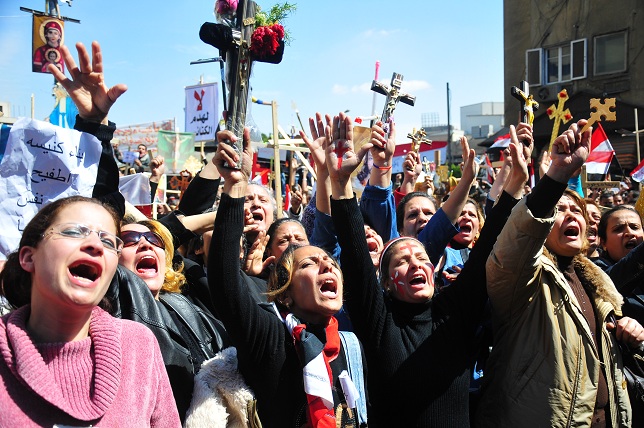In a DW interview, Islamism expert Arif Jamal says that slain Lashkar-e-Jhangvi leader Malik Ishaq had become a threat to the Pakistani military establishment, which “got rid” of him in a “fake police encounter.”
Malik Ishaq, former head of Pakistan’s banned militant Lashkar-e-Jhangvi (LeJ) group, and his thirteen associates were killed by police on July 29 after the convoy carrying the sectarian leader came under fire from armed gunmen.
The former leader of the outlawed Sunni group had been arrested on Saturday, July 25, in connection with the murder of dozens of people in targeted killings in the eastern Punjab province. He was being transported for questioning when the police convoy was ambushed. Ishaq, who was also on a US list of global terrorists, had previously faced several murder trials but had always been acquitted after witnesses refused to testify.
In a DW interview, Arif Jamal, an independent US-based journalist and author, says that while Ishaq’s death is certainly a blow to the LeJ, Pakistan cannot win the war against Islamic terror without abandoning the use of jihad and militants like Malik Ishaq as an instrument of its defense policy .
DW: Malik Ishaq’s killing has been hailed by Pakistani liberals as a victory of the security forces over terror. Do you also share the feeling?
Arif Jamal: I would have been happy if Ishaq had been hanged after being convicted in a court of law. The available evidence abundantly shows that Ishaq was killed in an orchestrated police encounter. Given the Pakistani political system, this could not have taken place without orders from the Pakistani military. This shows that the Pakistani state is unable to get rid of terrorists in a legal way even when it wants to.
What is the significance of Ishaq’s death considering the fact that he was on a US terror list?
There is absolutely no significance of his death in the sense that it will not help fight Islamist terrorism. We will forget about him in three to five days. They have killed hundreds of Islamist terrorists since 9/11 in police encounters and drone strikes but the terrorist problem has become more serious. We cannot win this war without forcing Pakistan to abandon the use of jihad as an instrument of its defense policy as a first step and, as a second step, force countries like Saudi Arabia to stop funding Islamist terrorist.
Why wasn’t the government able to prove cases against him in the court?
There are several reasons. First, many senior police officers have told me over the years that they were prevented by the Pakistani military from taking action against Islamist terrorists under the excuse that they were fighting jihad for the country. In many cases, the police were forced to either release them or file very weak cases against them in the courts. In many cases, terrorists were booked for using loud-speakers. Hafiz Saeed was usually booked for disturbing public peace. With extremely weak cases and no evidence, the courts are bound to set them free.
Also, there is a lot of support inside the legal community and police for Islamists and jihadists. The problem is that Pakistan does not want to punish them. Lastly, the police and judges come under threat whenever they move against them. The judge who condemned Mumtaz Qadri (the assassin of the former Governor of Punjab, Salman Taseer) had to seek asylum in a Western country.
How close was Ishaq to the Pakistani military establishment?
He was pretty close. Pakistani media have reported that in 2009 he was flown on the Army Chief’s plane from his cell in Lahore to the garrison town of Rawalpindi to hold talks with gunmen holed up inside the army’s GHQ. One of the armed assailants had named him as the mastermind behind the assault, General Ashfaq Pervez Kayani had promised to free him as a reward.
How are Ishaq’s supporters and followers likely to react to his killing?
I don’t think there will be any large-scale violence. I believe those who decided to kill him must have taken his rivals in the group into confidence and neutralized his group to a large extent.
Let me give you a little background on this. The gulf between the Pakistani military and the Afghan Taliban, created in the wake of the US-led attack on Afghanistan, when the Pakistani military joined the Americans against the Taliban government, has widened with the passage of time.
The Pakistani military has been paving the way for the Afghan Salafists to replace the Deobandi Taliban in Afghanistan with the help of Jamatud Dawa (JuD)/ Lashkar-e-Taiba after the US drawdown.
In recent years and months great change has been taking place in Afghanistan-Pakistan. The Deobandi Taliban groups, such as LeJ, both in Afghanistan and Pakistan, have been drifting towards Salafism and joining the “Islamic State” (IS). As both JuD and IS are Salafists, they have some sort of informal alliance to replace Deobandi Taliban with Salafists in Afghanistan.
According to some of my sources in Pakistan, Ishaq was refusing to accept IS and had developed serious differences with the Pakistani military establishment over supporting Salafism. The Pakistani military is known to have eliminated “bad” Taliban in such situations in the past. His death seems to have removed an obstacle in the way of Salafist rule in Afghanistan.
Arif Jamal is an independent US-based journalist and author of several books, including “Call For Transnational Jihad: Lashkar-e-Taiba 1985-2014.”
The interview was conducted by Shamil Shams.

